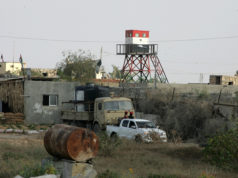In an audio address to the nation Monday night, Egypt’s Supreme Council of the Armed Forces called on the current army chief to run for the country’s presidency. The nation’s top military body said Abdel Fattah al-Sisi possessed a “mandate and an obligation” from the “broad masses” of Egypt’s public. The Arab press now expects al-Sisi to announce his candidacy for President as soon as this week for a race he could win in a landslide.
Just hours before the Army’s announcement, Interim President Adly Mansour, who al-Sisi himself appointed, promoted al-Sisi to the top rank of field marshall. A senior military official told Western media that such a promotion is “meant to honour Sisi” before he steps down from military service, a prerequisite to running for office.

Supporters of Egypt’s army chief General Abdel Fattah al-Sisi holds a poster of Sisi in Tahrir square in Cairo, on the third anniversary of Egypt’s uprising, January 25, 2014. (Photo: Reuters) |
Interim President Mansour also announced changes on Saturday to the army-backed timetable that is designed to provide democratic rule in Egypt. The presidential election will now precede the election of a new parliament. Such a move could give Egypt’s already powerful executive branch more influence over the state, without checks and balances from the legislature. Earlier this month, Egyptian voters also approved a new constitution that ensures the president and the military remain insulated from many of the Parliament’s decision.
This weekend also saw rival demonstrations in Cairo marking the 2011 uprising that overthrew President Hosni Mubarak. Government officials helped facilitate a pro-military gathering at Tahrir Square, the focal point of anti-Mubarak protests almost three years ago. Hundreds of thousands of people gathered waving Egyptian flags and displaying pro-al-Sisi banners.
But not all Egyptians share the same enthusiasm for a new military backed president, with the country remaining deeply divided. Muslim Brotherhood officials and some secular liberals, both victims of government crackdowns, oppose al-Sisi for being too oppressive. Anti-government demonstrators held competing rallies around the country and in other parts of Cairo on Friday and Saturday. Over 49 people were killed, and thousands were arrested when police attempted to break up protesters.
Even if al-Sisi becomes president with a strong mandate, significant security challenges lie ahead. Most notably a new low-level Islamist-inspired insurgency has recently spread from Sinai into the rest of Egypt. The past few weeks have seen the bombing of police headquarters in Cairo, killing four people, and other explosions around the city. After failing in to gain political traction from protests, some radicalized Muslim Brotherhood members may now embrace violence to achieve their goals.





